Items filtered by date: July 2025
Types and Symptoms of Plantar Warts
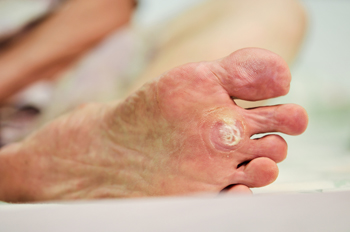
Plantar warts are small, rough growths that develop on the soles of the feet due infection by certain strains of the human papillomavirus, or HPV. The virus often enters the skin through tiny cuts or weak spots, especially in moist environments like public showers or pool areas. Plantar warts may appear as a single growth with thickened skin or as clusters, known as mosaic warts. A typical symptom is a painful, grainy bump with tiny black dots, which are clotted blood vessels. These warts often press inward due to the pressure of walking or standing, sometimes making each step feel like stepping on a pebble. Although some may disappear over time, plantar warts that persist or cause pain may require medical treatment. A podiatrist can help by diagnosing the wart and providing appropriate care, including surgery, if needed. If you have a growth on the sole of the foot, it is suggested that you schedule an appointment with a podiatrist for an exam and appropriate treatment.
Plantar warts can be very uncomfortable. If you need your feet checked, contact one of out podiatrists from Alta Ridge Foot Specialist. Our doctors will assist you with all of your foot and ankle needs.
About Plantar Warts
Plantar warts are the result of HPV, or human papillomavirus, getting into open wounds on the feet. They are mostly found on the heels or balls of the feet.
While plantar warts are generally harmless, those experiencing excessive pain or those suffering from diabetes or a compromised immune system require immediate medical care. Plantar warts are easily diagnosed, usually through scraping off a bit of rough skin or by getting a biopsy.
Symptoms
- Lesions on the bottom of your feet, usually rough and grainy
- Hard or thick callused spots
- Wart seeds, which are small clotted blood vessels that look like little black spots
- Pain, discomfort, or tenderness of your feet when walking or standing
Treatment
- Freezing
- Electric tool removal
- Laser Treatment
- Topical Creams (prescription only)
- Over-the-counter medications
To help prevent developing plantar warts, avoid walking barefoot over abrasive surfaces that can cause cuts or wounds for HPV to get into. Avoiding direct contact with other warts, as well as not picking or rubbing existing warts, can help prevent the further spread of plantar warts. However, if you think you have developed plantar warts, speak to your podiatrist. He or she can diagnose the warts on your feet and recommend the appropriate treatment options.
If you have any questions, please feel free to contact our offices located in Mars Hill, Spruce Pine, and Boone, NC . We offer the newest diagnostic and treatment technologies for all your foot care needs.
Are You Suffering From Nerve Damage?
Causes of Swollen Ankles and Feet
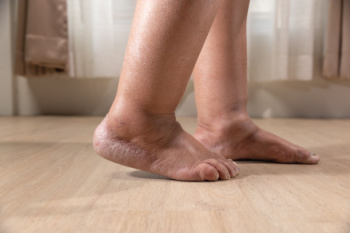
Swelling in the feet and ankles often occurs due to fluid accumulation in the soft tissues, known as edema. This can occur for many reasons, ranging from prolonged standing or walking to underlying health conditions such as heart, kidney, or liver disease. Injury, such as an ankle sprain or fracture, can also lead to localized swelling, as well as bruising or pain. Infections like cellulitis or abscesses may cause the skin to appear red, warm, or oozing. Swelling of the feet or ankles may affect one or both sides and can leave indentations when pressed, known as pitting edema. A podiatrist can evaluate the location, severity, and associated symptoms of swelling to help determine the underlying cause and recommend appropriate treatment. If you notice unexplained swelling of the feet and ankles, it is suggested that you make an appointment with a podiatrist for a diagnosis and treatment.
Swollen feet can be a sign of an underlying condition. If you have any concerns, contact one of out podiatrists of Alta Ridge Foot Specialist. Our doctors can provide the care you need to keep you pain-free and on your feet.
Swollen feet are a common ailment among pregnant women and people who stand or sit for extended periods. Aging may increase the possibility of swollen feet and patients who are obese often notice when their feet are swelling too. There may be medical reasons why swollen feet occur:
- Phlebitis - A condition that causes the veins to become inflamed and can also cause leg pain.
- Liver disease - This may lead to low blood levels of albumin which is a protein. This can cause fluid in the blood to pass into the tissues and several areas of the body can become swollen.
- Heart failure - When the heart doesn’t pump properly the blood that is normally pumped back to the heart can pool in the veins of the legs causing swollen feet.
- Kidney disease - One of the main functions of the kidneys is releasing excess fluid in the body. This type of condition can make it difficult for the kidneys to function properly, and as a result the feet may become swollen.
- Deep-vein thrombosis (DVT)- This is a serious condition where blood clots form in the veins of the legs. They can block the return of blood from the legs to the heart which may cause the feet to swell. It is important to be treated by a podiatrist if this condition is present.
Swollen feet can also be caused by bone and tendon conditions, including fractures, arthritis, and tendinitis. Additionally, there may be skin and toenail conditions and an infection may cause the feet to swell. Patients who take medicine to treat high blood pressure may be prone to getting swollen feet.
Many patients elevate their feet to help relieve the swelling and this is generally a temporary remedy. When a podiatrist is consulted the reason behind the swelling can be uncovered and subsequently treated.
If you have any questions please contact our offices located in Mars Hill, Spruce Pine, and Boone, NC . We offer the newest diagnostic and treatment technologies for all your foot and ankle needs.
Plantar Fasciitis and Heel Spur Syndrome
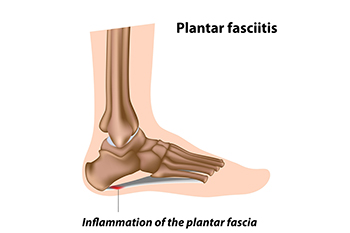
Plantar fasciitis, also known as heel spur syndrome, is a common cause of heel pain. It occurs when the thick band of tissue along the bottom of the foot becomes inflamed, often where it connects to the heel bone. Signs include sharp pain when taking the first steps in the morning or after long periods of rest. Causes include overuse, wearing poor footwear, or standing for long hours. Risk factors include flat feet, high arches, and obesity. A podiatrist can diagnose the condition and provide treatments such as stretching plans or custom orthotics. If you have consistent heel pain, it is suggested that you visit a who can provide appropriate relief and treatment solutions.
Plantar fasciitis can be very painful and inconvenient. If you are experiencing heel pain or symptoms of plantar fasciitis, contact one of out podiatrists from Alta Ridge Foot Specialist. Our doctors can provide the care you need to keep you pain-free and on your feet.
What Is Plantar Fasciitis?
Plantar fasciitis is the inflammation of the thick band of tissue that runs along the bottom of your foot, known as the plantar fascia, and causes mild to severe heel pain.
What Causes Plantar Fasciitis?
- Excessive running
- Non-supportive shoes
- Overpronation
- Repeated stretching and tearing of the plantar fascia
How Can It Be Treated?
- Conservative measures – anti-inflammatories, ice packs, stretching exercises, physical therapy, orthotic devices
- Shockwave therapy – sound waves are sent to the affected area to facilitate healing and are usually used for chronic cases of plantar fasciitis
- Surgery – usually only used as a last resort when all else fails. The plantar fascia can be surgically detached from the heel
While very treatable, plantar fasciitis is definitely not something that should be ignored. Especially in severe cases, speaking to your doctor right away is highly recommended to avoid complications and severe heel pain. Your podiatrist can work with you to provide the appropriate treatment options tailored to your condition.
If you have any questions, please feel free to contact our offices located in Mars Hill, Spruce Pine, and Boone, NC . We offer the newest diagnostic and treatment technologies for all your foot care needs.
Managing a Broken Toe
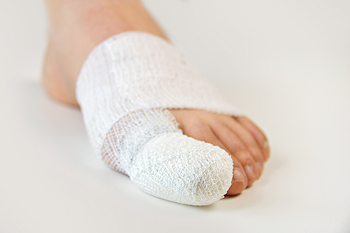
A broken toe may result from a direct hit, such as stubbing the toe, dropping something heavy on it, or from repeated stress like running or jumping. Pain, swelling, bruising, and difficulty walking are common signs of a toe fracture. Some breaks can cause the bone to shift out of place, while others stay aligned but still cause discomfort. A broken toe may be open, with a wound that exposes the bone, or closed, where the skin remains unbroken. Ignoring the injury can lead to long-term problems, such as poor healing or joint stiffness. A podiatrist can check for bone displacement or hidden fractures using an X-ray or other imaging, as well as assess any risks of infection or complications. Depending on the type and severity of the break, a podiatrist may stabilize the toe with a cast, special shoe, or taping method. Surgery may be needed to realign the bone. If you have broken a toe, it is suggested that you promptly schedule an appointment with a podiatrist for an exam and appropriate treatment options.
Broken toes may cause a lot of pain and should be treated as soon as possible. If you have any concerns about your feet, contact one of out podiatrists from Alta Ridge Foot Specialist. Our doctors will treat your foot and ankle needs.
What Is a Broken Toe?
A broken toe occurs when one or more of the toe bones of the foot are broken after an injury. Injuries such as stubbing your toe or dropping a heavy object on it may cause a toe fracture.
Symptoms of a Broken Toe
- Swelling
- Pain (with/without wearing shoes)
- Stiffness
- Nail Injury
Although the injured toe should be monitored daily, it is especially important to have a podiatrist look at your toe if you have severe symptoms. Some of these symptoms include worsening or new pain that is not relieved with medication, sores, redness, or open wounds near the toe.
If you have any questions please feel free to contact our offices located in Mars Hill, Spruce Pine, and Boone, NC . We offer the newest diagnostic tools and technology to treat your foot and ankle needs.
Understanding and Treating Cracked Heels
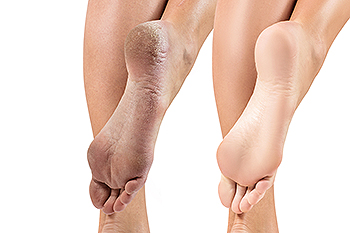
Cracked heels, also known as heel fissures, occur when the skin on the heels becomes dry, thickened, and splits open. One common cause is a deficiency in essential nutrients like vitamin E, which helps maintain skin health. Other contributing factors include dry skin, harsh soaps that strip natural oils, poor foot hygiene, wearing improper footwear, and age-related skin thinning. Cracked heels can become painful and lead to infections if left untreated. A podiatrist can evaluate the severity, recommend moisturizing treatments, offer debridement of thick skin, and suggest proper footwear or custom inserts. Cracked heels can be painful. If this applies to you, it is suggested that you schedule a visit with a podiatrist who can provide expert care and tailored solutions for your foot health needs.
If the skin on your feet starts to crack, you may want to see a podiatrist to find treatment. If you have any concerns, contact one of out podiatrists from Alta Ridge Foot Specialist. Our doctors can provide the care you need to keep you pain-free and on your feet.
Cracked Heels
It is important to moisturize your cracked heels in order to prevent pain, bleeding, and infection. The reason cracked heels form is because the skin on the foot is too dry to support the immense pressure placed on them. When the foot expands, the dry skin on the foot begins to split.
Ways to Help Heal Them
- Invest in a good foot cream
- Try Using Petroleum Jelly
- Ease up on Soaps
- Drink Plenty of Water
Ways to Prevent Cracked Heels
- Moisturize After Showering
- Skip a Shower
- Keep Shower Water Lukewarm
- Don’t Scrub Your Feet
If you are unsure how to proceed in treating cracked heels, seek guidance from a podiatrist. Your doctor will help you with any questions or information you may need.
If you have any questions, please feel free to contact our offices located in Mars Hill, Spruce Pine, and Boone, NC . We offer the newest diagnostic and treatment technologies for all your foot care needs.

